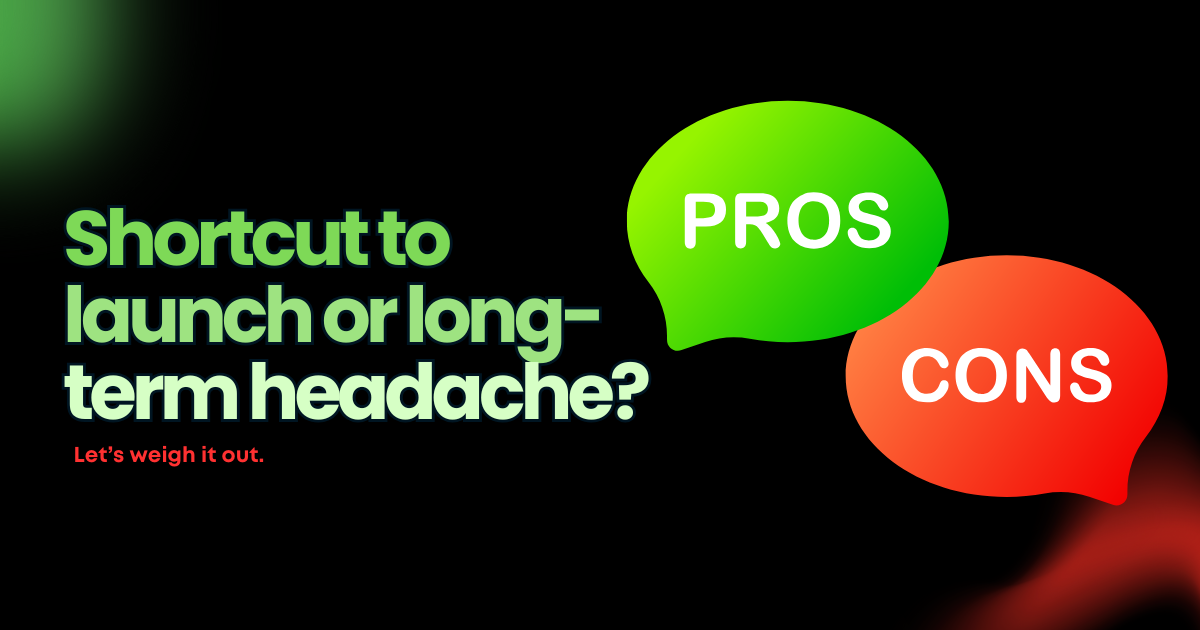
Thinking of launching a telemedicine app but not sure whether to build from scratch or use a pre-built solution?
Wondering how to get to market quickly without burning through your budget?
Over the past decade, ready-made telemedicine clone scripts have emerged as a tempting shortcut.
These scripts replicate the functionality of popular telehealth platforms and are available at a fraction of the cost—some priced under $100—compared to custom-built solutions that can cost tens or even hundreds of thousands of dollars.
But is going the clone route always the smartest move?
This article dives into the pros and cons of using a ready-made telemedicine clone script, helping you weigh speed and affordability against customization, scalability, and long-term growth.
Whether you’re a startup testing an MVP or a clinic looking to digitize services quickly, understanding both sides of the equation is key before making your decision.
What is a Ready-Made Telemedicine Clone Script?
A ready-made telemedicine clone script is a pre-built platform or script that mimics the core features of a successful telehealth application. These solutions often come as SaaS-based products, self-hosted scripts, or open-source tools that you can license, rebrand, and modify to some extent.
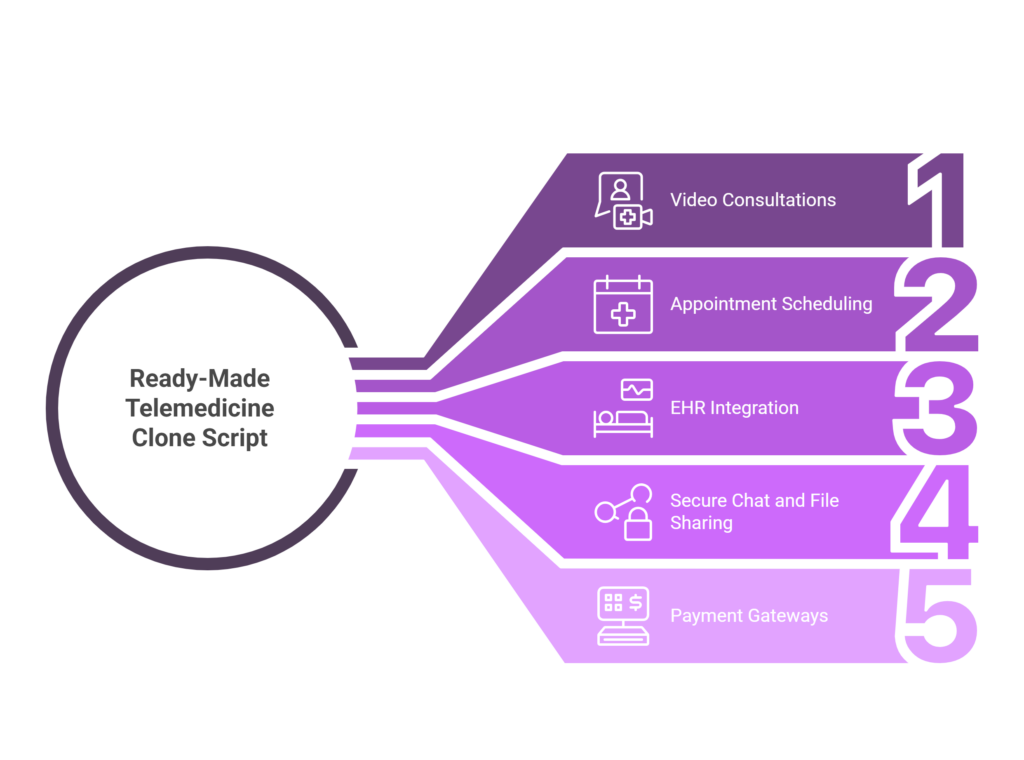
Common features include:
- Video consultations
- Appointment scheduling
- EHR integration
- Secure chat and file sharing
- Payment gateways
These clones aim to provide a plug-and-play solution for clinics, hospitals, and startups looking to go digital quickly.
Pros of Using a Ready-Made Telemedicine Clone Script
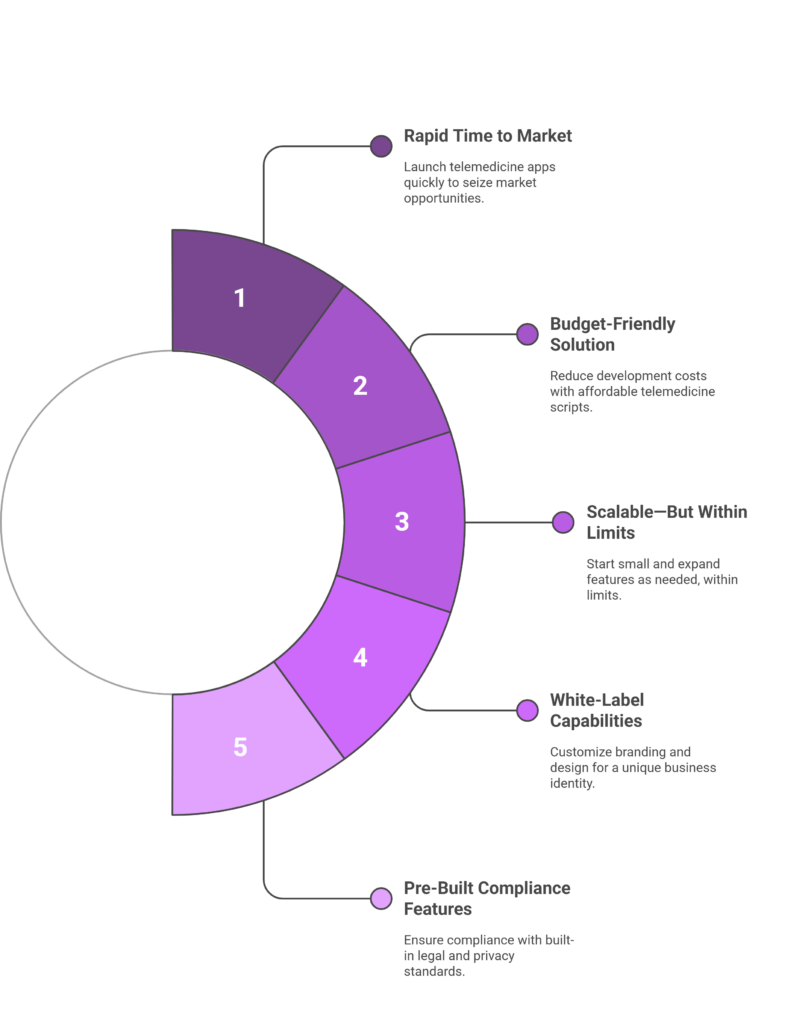
1. Rapid Time to Market
One of the most compelling benefits is speed. Instead of spending 6 to 12 months building a custom app from the ground up, you can go live with a functional MVP in just weeks—or even days. This is particularly valuable if you’re aiming to validate an idea quickly or respond to market opportunities without delay.
2. Budget-Friendly Solution
Custom app development is a costly endeavor. A ready-made script significantly cuts initial costs and minimizes the risk of budget overruns. It’s a practical option for startups, clinics, or healthcare providers looking for affordable tech solutions without compromising on core functionality.
3. Scalable—But Within Limits
Clone scripts are often built with modular architecture, allowing you to start small and add features as your needs grow—such as video calling or multi-language support. However, scalability can have limitations. As your platform evolves, you may eventually outgrow the clone’s built-in structure and need to consider custom development for full flexibility and performance.
4. White-Label Capabilities
Most clone solutions offer white-label options, enabling you to customize branding, domain, and design elements to match your business identity. This gives your product a professional look and feel, without having to reinvent the wheel.
5. Pre-Built Compliance Features
Many ready-made telemedicine platforms come equipped with built-in compliance modules such as HIPAA (in the U.S.) or GDPR (in Europe). This saves time and ensures you’re meeting necessary legal and privacy standards from day one.
Cons of Using a Ready-Made Telemedicine Clone Script
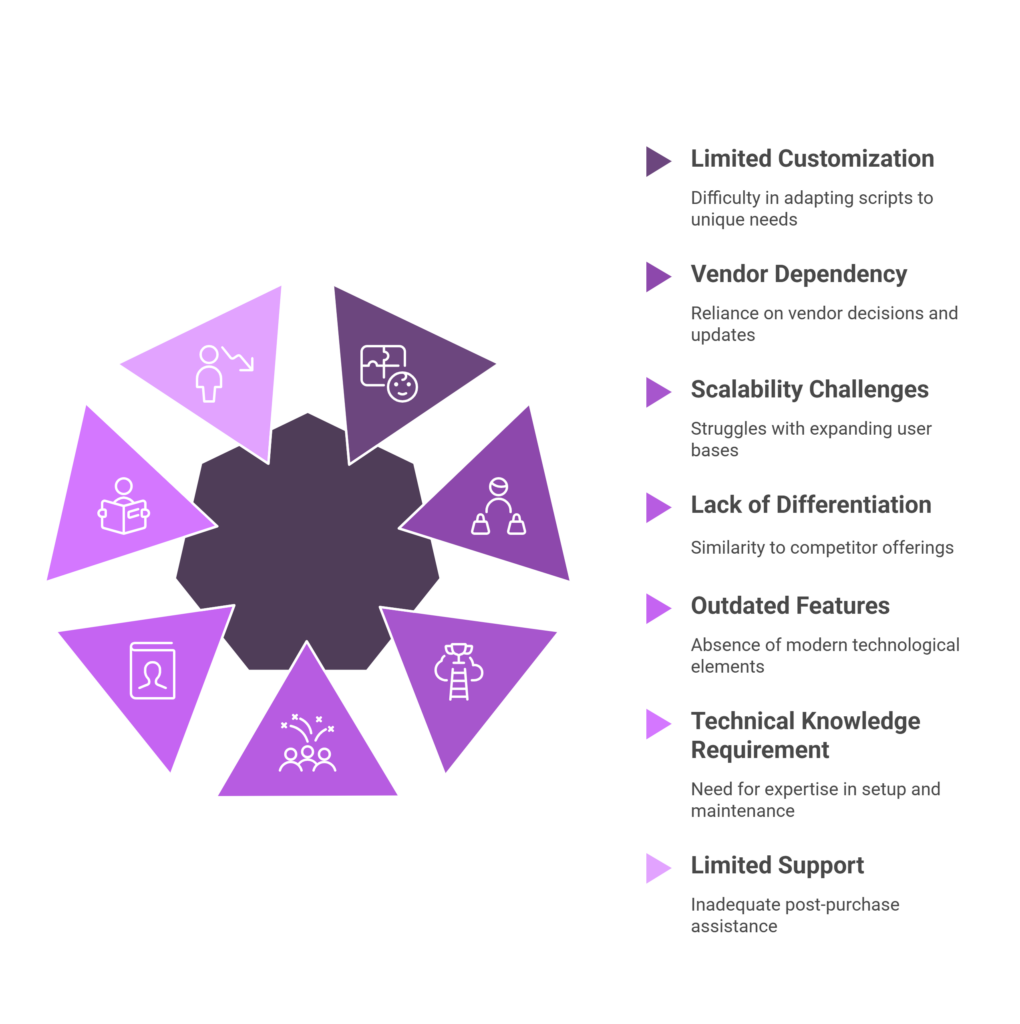
1. Limited Customization
Out-of-the-box solutions often come with fixed workflows and pre-set UI components. If your solution requires unique features, integrations, or a tailored user experience, customization can be difficult or expensive to implement.
2. Dependency on Vendor
Using a clone script ties you to the vendor’s roadmap, pricing, and technology decisions. If they stop updating the software, introduce limitations, or raise prices, your options are limited—often requiring a full rebuild to regain control.
3. Scalability Challenges
While clone scripts may handle moderate growth, they can struggle with larger user bases or complex workflows. Major scalability upgrades often require deep architectural changes, which defeat the purpose of using a quick-start clone.
4. Lack of Differentiation
If your competitors are using the same clone script, your app may look and function similarly. This lack of uniqueness can hurt your branding and make it harder to build customer loyalty or stand out in the crowded telehealth market.
5. Outdated Features
Some clone scripts are built on older technology stacks and might not include the latest features expected by modern users—like AI-based symptom checkers, advanced appointment logic, or real-time chat functionality. Updating them may not be straightforward and could incur high costs.
6. Need for Technical Knowledge
Although marketed as plug-and-play, many clone scripts still require a decent level of technical expertise to set up, deploy, and maintain. Without an in-house tech team or expert help, launching or scaling the product can be frustrating.
7. Limited Technical Support & Maintenance
Not all clone vendors offer robust post-purchase support. In cases where updates, bug fixes, or compatibility issues arise, you may be left handling things on your own. This can slow down your operations and leave your platform vulnerable over time.
When to Consider a Telemedicine Clone Script
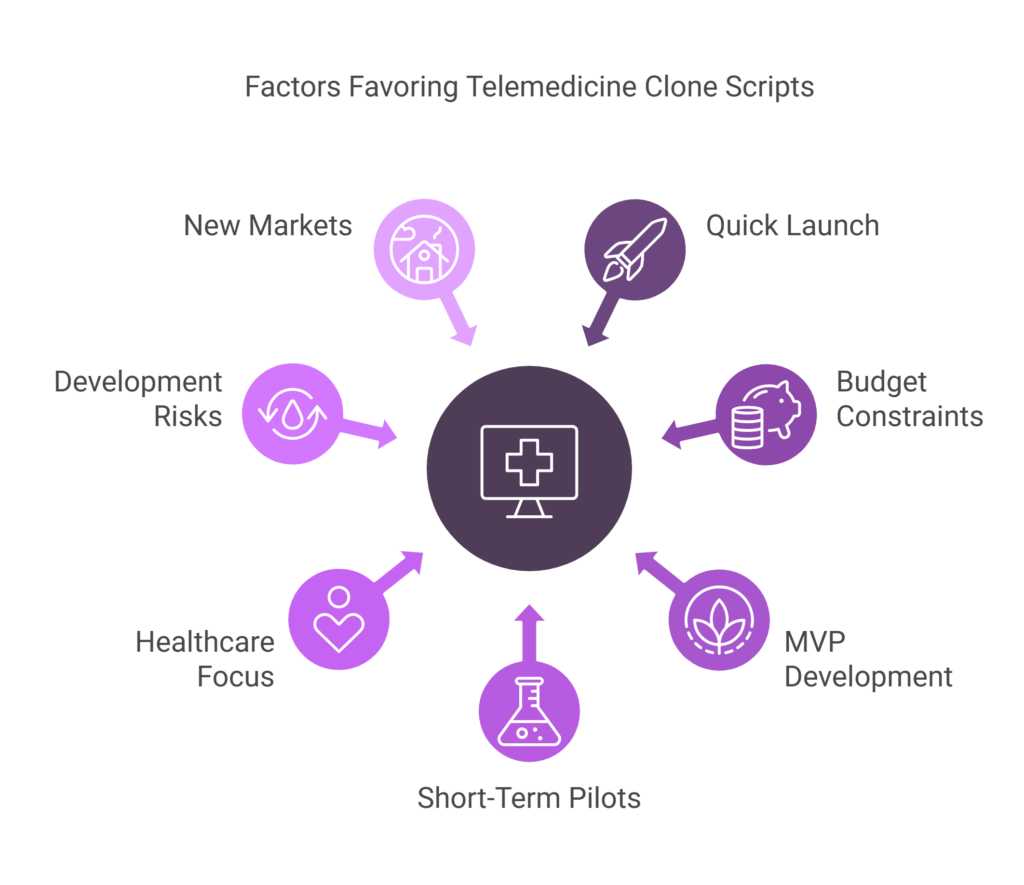
1. You Need to Launch Quickly
If speed is essential, a telemedicine clone script can get you up and running fast. Instead of waiting months for a custom build, clones allow you to deploy a functional platform in weeks or even days. Whether you’re responding to a health crisis or tapping into a new market, a ready-made solution ensures you don’t miss your window of opportunity.
2. Your Budget is Limited
Launching a telemedicine platform from scratch is expensive. Development, testing, and maintenance costs can quickly add up, especially for startups. A clone, on the other hand, offers a more affordable path with predictable pricing. For small clinics or health-focused startups with limited funds, clones provide an accessible entry point into telehealth.
3. You’re Building a Minimum Viable Product (MVP)
If your goal is to test your idea and validate the market, a telemedicine clone script is an ideal choice. It allows you to quickly build an MVP, test key features, and gather real-world feedback from users without the long development cycles. You can refine your offering based on insights and iterate without investing too much upfront.
4. You’re Running a Short-Term Pilot
Clones are perfect for short-term trials or pilot programs. Whether you’re testing a new service or expanding to a new geographic area, a ready-made solution lets you gather data and refine your approach before committing to a full-scale launch. This is ideal if your platform is not intended for long-term use or is just part of a temporary initiative.
5. Your Core Business is Healthcare, Not Tech
For healthcare professionals and providers, the focus should be on delivering quality care, not building complex software. If you don’t have an in-house tech team or expertise, a telemedicine clone script can take the technical burden off your shoulders. It lets you concentrate on patient care while the platform’s core functionality is managed by experts.
However, it’s worth noting that while clone scripts offer a quicker start, they can be restrictive when it comes to customizing features to suit your specific workflows or evolving business need.
6. You Want to Avoid Development Risks
Developing a custom telemedicine platform carries certain risks—delays, unforeseen issues, and technical debt can all cause problems down the road. A clone eliminates many of these risks because the platform is pre-tested and already optimized for common use cases. You can skip the guesswork and focus on using the platform rather than troubleshooting it.
7. You’re Looking to Test New Markets or Services
If you’re entering a new market, launching a new service, or offering telehealth in a niche area, a clone can be a great way to test the waters. With minimal investment, you can quickly determine whether the offering resonates with your audience and whether further customization is needed.
However, it’s important to note that clone scripts are built on popular platforms with basic features. While they may allow you to test, there will be little differentiation from existing leaders in the market. This lack of uniqueness can make it difficult to stand out and garner attention from potential users.
When to Build a Custom Telemedicine Platform
1. You Have Unique Requirements or Workflows
Telemedicine clone scripts provide a standardized approach, but they may not meet the specific needs of your business. If you have unique medical workflows, a specialized service offering, or require integration with other software tools (like EHR systems), building a custom platform will give you the flexibility to address these unique requirements.
2. Branding and User Experience are Top Priorities
A clone may get you started, but it often lacks the customization needed for a truly standout user experience. If branding is a priority for you, or if you want a completely unique design that sets your platform apart from competitors, custom development allows you to create a tailored experience that reflects your brand’s values and style.
3. You’re Focused on Long-Term Scalability
While clones are fine for small-scale implementations, they can struggle to scale effectively when your platform grows. If you foresee rapid user adoption, or if you anticipate needing complex integrations down the road, a custom platform allows you to build from the ground up with scalability in mind. You won’t be constrained by the limitations of a pre-built solution as your user base grows.
4. Security and Compliance Are Mission-Critical
Healthcare data is highly sensitive, and platforms need to comply with regulations like HIPAA (in the U.S.) or GDPR (in Europe). Some telemedicine clone scripts may not fully adhere to these standards or may offer limited options for customizing security features. With a custom platform, you can ensure that the app meets all the necessary security protocols and compliance requirements for your specific region or country.
5. You Want Complete Ownership of the Code and Data
One of the biggest drawbacks of using a clone is the lack of control over the platform’s codebase. With a custom solution, you own the entire code and data, giving you the freedom to make changes and improvements as needed. This is especially important if you plan to have full control over your patient data, workflows, or any proprietary features you wish to build in the future.
6. You Require Cutting-Edge Features
If your telemedicine platform needs advanced capabilities, such as artificial intelligence, predictive analytics, or integration with smart health devices, a custom build is the best option. While clones offer basic functionalities, a custom solution allows you to implement more sophisticated features that can set your platform apart and give you a competitive edge.
7. You Plan to Differentiate Your Offering in a Competitive Market
Telemedicine is a rapidly growing market with increasing competition. If you want to differentiate your platform from others, a custom solution will give you the freedom to innovate. Whether it’s specialized healthcare services, a unique patient engagement approach, or a revolutionary user interface, custom development lets you create a platform that stands out.
8. You Need to Integrate with Complex or Legacy Systems
Healthcare organizations often rely on existing legacy systems (e.g., EHR or practice management software). A custom platform allows you to seamlessly integrate with these systems and ensure that data flows smoothly between different applications. With a ready-made clone, integration with third-party tools may be more limited, making it harder to ensure that all systems work together efficiently.
Telemedicine Clone Script Vs Custom Development
| Factor | Ready-Made telemedicine clone script | Custom Telemedicine Platform |
| Time to Market | Fast, can be launched within weeks or days | Slow, may take several months or longer to develop |
| Cost | Lower upfront cost, budget-friendly | High upfront cost, expensive due to development and customizations |
| Customization | Limited customization, may not meet unique business needs | Fully customizable, can cater to specific needs and workflows |
| Scalability | Limited scalability, may face issues with high growth | Highly scalable, built to handle future growth and demands |
| Security and Compliance | May not meet all regulatory requirements (HIPAA, GDPR, etc.) | Fully compliant with regulatory standards (HIPAA, GDPR, etc.) |
| Branding and User Experience | Basic customization, may not offer unique branding opportunities | Custom branding, fully tailored UX/UI for a unique experience |
| Control Over Code and Data | Limited control, reliant on third-party vendor | Full control over code and data, allowing for complete ownership |
| Risk | Low risk, tested and proven frameworks | Higher risk, potential for development delays and unforeseen issues |
| Feature Set | Pre-built, offers standard telemedicine features | Can include advanced features, such as AI, wearables integration, etc. |
| Maintenance & Support | Ongoing support included updates handled by the vendor | Maintenance and updates handled by internal team |
| Integration with Other Systems | Limited integration options | Easy to integrate with existing healthcare systems (EHR, PM) |
| Differentiation in the Market | Limited uniqueness, may look similar to other platforms | High potential for differentiation with unique features and design |
| Ownership and Control | Limited ownership, reliance on third-party vendor | Complete ownership of the platform, code, and data |
Conclusion
A ready-made telemedicine clone script can be a smart shortcut to entering the digital health space—especially if time and budget are limited. However, it’s not a one-size-fits-all solution. While clones offer speed, affordability, and simplicity, they may limit your ability to innovate, scale, or stand out in a crowded market.
Before making a decision, weigh your business goals, technical needs, and long-term vision. Sometimes, starting with a clone and moving to a custom build later is a strategic way to balance risk and growth.
Need help choosing or customizing a telemedicine clone? Let’s talk. 👨⚕️💻
